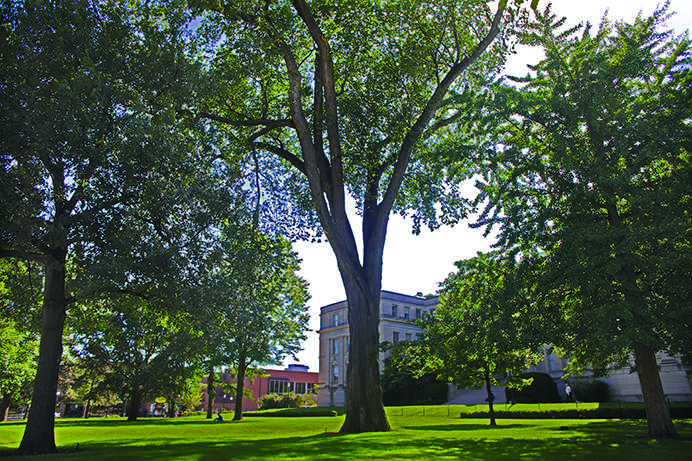By Vivian Medithi
While most people know about the effect of deforestation in the Amazon rain forest on global warming, few worry about trees in our own backyards. But the environmental effect of local deforestation, though on a smaller scale, will be felt much more harshly. Over the past five years, Iowa has lost 3.4 percent of its forestland, more than 73,000 football fields of trees.
More concerning is that, according to the same report by the U.S. Department of Agriculture Forest Service, net annual growth of live trees older than 5 is down by 24.2 percent, while net mortality for the same group is up by 36.9 percent. The majority of Iowa’s trees are oak and hickory, with elm, ash, and cottonwood making up the second largest area of timberland in the state; these two groups are responsible for almost all of the trees 9 feet or taller in the state. All but a handful of Iowa’s ash trees are expected to be extinct by 2034 because of the ash-borer invasion, while oak wilt remains a persistent, if less severe, threat in the state.
All these numbers are a way of quantifying the simple fact that Iowa has a deforestation problem and that the biggest and most plentiful trees are some of the most vulnerable in the state. In an area driven by agriculture, environmental concerns have often been laid at the wayside in the name of economics; people have varying opinions on whether this is the right thing to do, but no one can deny the impact these choices have on Iowa’s environment.
Deforestation is habitat loss for many animals, leading to reduced biodiversity of animals as well as trees across the state. No organism exists in a vacuum, and biodiversity is intimately tied to the health of the planet. A tree is cut down; the birds, squirrels, and other animals that used to call it home relocate somewhere else, if they don’t die before finding a new tree. The animals that used to prey on these species will migrate in search of food and then the animals higher up the food chain. Loss of one organism in an ecosystem reverberates across the web of life, and ultimately affects humans, the de facto head of the food chain.
Another common fate of trees is use as biomass for energy. This common practice is considered “carbon neutral” because the idea goes that if a low-grade tree is cut down, and a new tree is planted in its place, over the course of its lifetime, the new tree will resequester carbon from the atmosphere equivalent to the carbon emitted by burning the old tree. Most scientists have asserted that this definition of “carbon neutral” obscures the immediate harm of burning mature trees and replacing them with juveniles. As trees mature, their ability to resequester carbon increases exponentially, meaning that even if we replaced every mature tree we cut down with two juveniles, the net resequestration capacity of our woodlands would still be dramatically reduced.
While some still deny the hard science of man-made global warming, there are other, more direct effects that deforestation has on the lives of Iowans. Most of Iowa’s best agricultural land was cleared of trees more than a century and decades ago. So much of the land being cleared now is either subpar in terms of crop-carrying capacity or part of riparian buffers. Riparian buffers are tracts of native trees, shrubbery, and grasses that border crop fields near bodies of water, such as Lake Macbride or the Iowa River. Riparian buffers serve to reduce soil erosion and sedimentation, as well as prevent fertilizer runoff. The cost of their deforestation is tangible and will affect not just Iowans’ wallets but also their dinner plates. Iowa spends more than $4 million annually to dredge lakes of sediment, and without these buffers in place, that number will drastically increase.
Fertilizer runoff wrecks the pH of water and frequently manifests as huge algal blooms, which cause massive damage to aquatic ecosystems by blocking sunlight to organisms below them. This hurts not just wild fish stocks but also aquaculture fish stocks.
The Republican Party platform this year is frightening in many ways, but one of the glossed-over details is the flat-out denial of global climate change in the economic platform. Capitalism has frequently driven some of the worst environmental disasters in human history, whether their harm is seen immediately, as in oil spills, or more slowly, as we have seen and will continue to see with deforestation. Iowans need to take a stand to better preserve our ecosystem; it’s the only one we’ve got.



